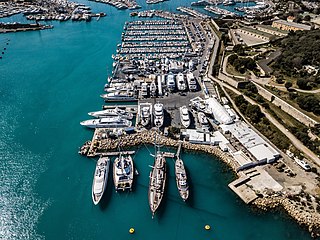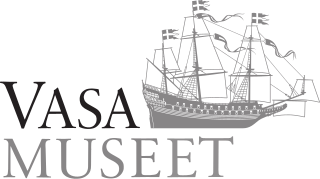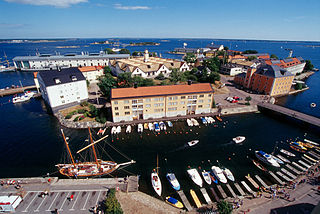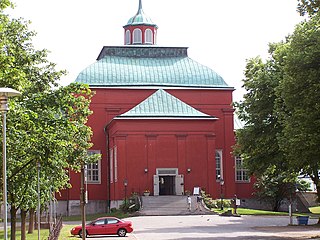
A shipyard, also called a dockyard or boatyard, is a place where ships are built and repaired. These can be yachts, military vessels, cruise liners or other cargo or passenger ships. Compared to shipyards, which are sometimes more involved with original construction, dockyards are sometimes more linked with maintenance and basing activities. The terms are routinely used interchangeably, in part because the evolution of dockyards and shipyards has often caused them to change or merge roles.

A maritime museum is a museum specializing in the display of objects relating to ships and travel on large bodies of water. A subcategory of maritime museums are naval museums, which focus on navies and the military use of the sea.

The Vasa Museum is a maritime museum in Stockholm, Sweden. Located on the island of Djurgården, the museum displays the only almost fully intact 17th-century ship that has ever been salvaged, the 64-gun warship Vasa that sank on her maiden voyage in 1628. The Vasa Museum opened in 1990 and, according to the official website, is the most visited museum in Scandinavia. Together with other museums such as the Stockholm Maritime Museum, it belongs to the Swedish National Maritime Museums (SNMM).

Karlskrona is a locality and the seat of Karlskrona Municipality, Blekinge County, Sweden with a population of 66,675 in 2018. It is also the capital of Blekinge County. Karlskrona is known as Sweden's only baroque city and is host to Sweden's largest naval base and the headquarters of the Swedish Coast Guard.

Bethlehem Steel Corporation Shipbuilding Division was created in 1905 when the Bethlehem Steel Corporation of Bethlehem, Pennsylvania, acquired the San Francisco shipyard Union Iron Works. In 1917 it was incorporated as Bethlehem Shipbuilding Corporation, Limited.

Fredrik Henrik af Chapman was a Swedish shipbuilder, scientist and officer in the Swedish navy. He was also manager of the Karlskrona shipyard 1782–1793. Chapman is credited as the world's first person to apply scientific methods to shipbuilding and is considered to be the first naval architect.

The Kaiser Shipyards were seven major shipbuilding yards located on the United States west coast during World War II. Kaiser ranked 20th among U.S. corporations in the value of wartime production contracts. The shipyards were owned by the Kaiser Shipbuilding Company, a creation of American industrialist Henry J. Kaiser (1882–1967), who established the shipbuilding company around 1939 in order to help meet the construction goals set by the United States Maritime Commission for merchant shipping.

The Dalarö wreck is a shipwreck of a 17th-century ship lying in the waters off Edesön near Dalarö, southeast of Stockholm, Sweden. It is the remains of a three-masted armed vessel. It was discovered in 2003 but it was not made public until March 2007.

The Karlskrona naval base is the largest naval base of the Swedish Navy. Located in Blekinge in southern Sweden, the base has close ties with the city of Karlskrona. It has an exceptionally well-sheltered location: arcs of islands provide a strong defense not only from the sea but also from land attacks. Two of Sweden's three naval warfare flotillas are based there. It contains the Marinmuseum and the Ropewalk, the longest wooden building in the country.

Johannes ("Johan") Törnström was Admiralty sculptor to the Swedish Navy at the Karlskrona naval base. He carved a number of figureheads for naval vessels, which are now housed at the Marinmuseum.

Stumholmen is a small island to the east of Trossö in Karlskrona, Sweden. It is connected to the center of Karlskrona by the Bastionsgatan bridge. Formerly the property of the Navy, today it houses the National Naval Museum (Marinmuseum), one of Sweden's oldest founded in 1752, the Hyper Island educational complex, and several other historic buildings. The unusual Slup- och barkass- skjulet is noted for its remarkable roof while buildings on Laboratorieholmen once served as an isolation hospital when the town was struck with disease. Comprehensive restoration and renovation work has been undertaken since the 1990s, providing a variety of interesting sights for tourists as well as residential accommodation for senior citizens. Since 1998, the Naval City of Karlskrona, of which Stumholmen is a key component, has been a UNESCO World Heritage Site.

Trossö is an island in Blekinge County, southern Sweden. It is situated within the Karlskrona archipelago. The main road, Osterleden (E22), connects the island to the mainland. The city of Karlskrona is spread over 30 islands, the main one being Trossö where the city center is located. Landmarks on Trossö include the Karlskrona naval base and Stortorget, the large town square situated in the centre of the island at its highest point. The two churches in the square, Trinity Church and Fredrik Church, were both designed by Nicodemus Tessin the Younger, with features such as burnt orange stucco and colonnades made of grey stone. Trossö is included in Karlskrona's distinction as a UNESCO World Heritage Site.

The Trinity Church is located at Karlskrona in Blekinge, Sweden. Along with the Karlskrona Admiralty Church (Amiralitetskyrkan), the church is situated in the main square, (Stortorget), at the center of the island of Trossö.

Blekinge archipelago is an archipelago in the Baltic Sea, located in Blekinge in the south of Sweden.

HSwMS Neptun is the second of three Näcken-class submarines, built to operate in the Baltic. Neptun entered service in December 1980. The next year she was involved an international incident when the Soviet submarine U 137 ran aground outside Karlskrona.

The Vrak – Museum of Wrecks is a Swedish museum of maritime archeology in Stockholm in Sweden. It is managed by the Maritime Museum in Stockholm and was opened in September 2021 in Boat hangar No 2 at Galärvarvet at Djurgården.

The Karlskrona Coastal Artillery Regiment, designation KA 2, was a Swedish Navy coastal artillery regiment of the Swedish Armed Forces which operated between 1902 and 2000. The unit was based in Karlskrona.

HSwMS Stockholm was a ship of the line that served in the Swedish Navy and was built by Karlskrona Naval Shipyard. She was named after Stockholm. Commissioned in 1857 and decommissioned in 1921.

The Naval Base is a naval unit within the Swedish Navy that has operated in various forms since 1928. The unit is mainly based within Karlskrona naval base in Karlskrona and but operations are also conducted at Berga Naval Base and Muskö naval base outside Stockholm and in Gothenburg.






















